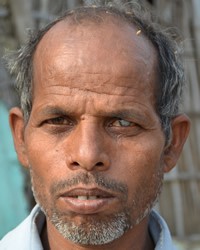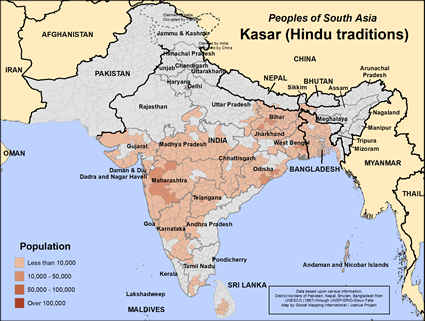The Kasar are a people who live in India, Bangladesh and Sri Lanka. The traditional occupation of the Kasar or Tambat people is the production and sale of copper and brass items. Tambat in Marathi means copper. Some Kasar claim Kshatriya level, the second highest caste in Hinduism. In other areas they are seen as merchants or common workers.
Originally, all Kasar were Hindus. Some Kasar converted to Islam during the time of the Moghal Empire. The primary language of the Kasar of Sri Lanka is Tamil.
Most of the Hindu Kasar people live in India. Smaller numbers live in Bangladesh and Sri Lanka. Most Sri Lankan Kasar reside in the Central and Uva states.
The economic position of the Kasar varies widely. Some are wealthy factory owners. These factories use modern machinery to make metal vessels, Hindu idols, utensils, bangles (rigid bracelets) and musical instruments. Other Kasar shape metals items like their ancestors did using ancient techniques. One of their specialties is using a hard form of brass called bell metal. They shape bell metal into polished bells and cymbals. The price of copper has skyrocketed in recent years due to its value in electrical wire. Some Kasar have had to leave the metal working profession and find new employment in agriculture and manufacturing. Literacy is a major issue for the Kasar. Only about 70% of Kasar can read and write. The Sri Lankan government is working to raise that number among all peoples in their country.
Monogamy or marriage to one wife is the accepted practice among the Kasar. Sons inherit property upon the death of their father. Families arrange marriages with the consent of the young people. Newly wed couples generally live with or near the groom's parents.
The main foods of the Kasar are rice, vegetables, fruit, lentils, and dairy products. As Hindus, they do not eat beef. Meat is often reserved for special occasions.
The Kasar practice Hinduism influenced by folk religion. They worship and serve the gods of the Hindu pantheon. Kali, the goddess of sexuality and death, is their patron deity. They also worship Vishnu and his avatars Rama and Krishna.
Hindus believe that by performing rituals and good works that they will attain moksha or freedom from the endless cycle of birth, death and rebirth. The Kasar visit Hindu temples and offer prayers, food, flowers and incense to their gods. There are many forms of Hinduism, each with its own deities and beliefs.
The main yearly holidays of the Hindu Kasar people are Holi, the festival of colors, Diwali, the festival of lights, Navratri, the celebration of autumn, and Rama Navami, Rama's birthday.
The Kasar of Sri Lanka need to hear the life-changing message of Jesus Christ in a way they can understand. They need help in educating their children and learning new jobs skills as their ancient profession is vanishing. The Kasar need to see the love and mercy of Christ lived out among them in practical ways.
Pray the Lord will open the hearts of the Kasar people to desire God's blessings through a movement of family-based discovery Bible studies.
Pray that strong movements to Jesus will bring whole Kasar families into rich experiences of God's blessings.
Pray that God will overthrow spiritual forces of darkness opposing the spread of His purposes among the Kasar people.
Scripture Prayers for the Kasar (Hindu traditions) in Sri Lanka.
https://joshuaproject.net/people_groups/17110/IN
en.wikipedia.org/wiki/Twashta Kasar
http://indpaedia.com/ind/index.php/Kasar
http://twashtakasartambat.blogspot.com/
| Profile Source: Keith Carey |












